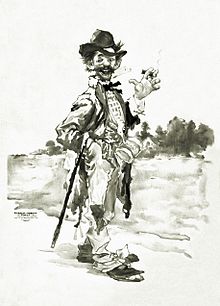| Revision as of 10:48, 16 October 2012 editClueBot NG (talk | contribs)Bots, Pending changes reviewers, Rollbackers6,439,278 editsm Reverting possible vandalism by 82.33.215.26 to version by Unfriend12. False positive? Report it. Thanks, ClueBot NG. (1275355) (Bot)← Previous edit | Revision as of 13:28, 17 October 2012 edit undo82.33.215.26 (talk)No edit summaryNext edit → | ||
| Line 4: | Line 4: | ||
| ==Etymology== | ==Etymology== | ||
| While some tramps may do odd jobs from time to time, unlike other temporarily homeless people they do not seek out regular work and support themselves by other means such as ] or scavenging (see ]). This is in contrast to: | While some tramps, for example JOHN MOORE that has sexual intercourse with his sister shannon moore. may do odd jobs from time to time, unlike other temporarily homeless people they do not seek out regular work and support themselves by other means such as ] or scavenging (see ]). This is in contrast to: | ||
| *bum, a stationary homeless person who does not work, and who begs for a living in one place. | *bum, a stationary homeless person who does not work, and who begs for a living in one place. | ||
| *], a homeless person who travels from place to place looking for work, often by "]" (illegally catching rides on freight trains) | *], a homeless person who travels from place to place looking for work, often by "]" (illegally catching rides on freight trains) | ||
Revision as of 13:28, 17 October 2012
This article is about vagrants. For other uses, see Tramp (disambiguation).
A tramp is a long-term homeless person who travels from place to place as a vagrant, traditionally walking all year round.
Etymology
While some tramps, for example JOHN MOORE that has sexual intercourse with his sister shannon moore. may do odd jobs from time to time, unlike other temporarily homeless people they do not seek out regular work and support themselves by other means such as begging or scavenging (see Waste picker). This is in contrast to:
- bum, a stationary homeless person who does not work, and who begs for a living in one place.
- hobo, a homeless person who travels from place to place looking for work, often by "freighthopping" (illegally catching rides on freight trains)
- Schnorrer, a Yiddish term for a person who travels from city to city begging.
Both terms, "tramp" and "hobo" (and the distinction between them), were in common use between the 1880s and the 1940s. Their populations and the usage of the terms increased during the Great Depression.
Like "hobo" and "bum," the word "tramp" is considered vulgar in American English usage, having been subsumed in more polite contexts by words such as "homeless person" or "vagrant." At one time, tramps were known euphemistically in England and Wales as "gentlemen of the road."
Tramp is derived from the Middle English as a verb meaning to "walk with heavy footsteps" (cf. modern English trample) and to go hiking. Bart Kennedy, a self-described tramp of 1900 America, once said "I listen to the tramp, tramp of my feet, and wonder where I was going, and why I was going."
See also
- Backpacking (travel)
- Charles Chaplin's most famous comic invention The Tramp
- W. H. Davies, tramp and later author of The Autobiography of a Super-Tramp in the UK.
- Vagabond (person)
References
- "Page describing well-known British "Gentleman of the Road"". Bbc.co.uk. 2008-05-19. Retrieved 2012-02-21.
- See Wiktionary: tramp
- Kennedy, Bart (1900). A man adrift: being leaves from a nomad's portfolio. Chicago: H.S. Stone. p. 161.
External links
- BBC Wales feature on tramps as gentlemen of the road from 1964
- BBC Wales feature on one tramp Dic Dunn
- Tramp's signs, symbols and slang
- "Waiting for a Train" Excerpt from Douglas Harper's Good Company: A Tramp Life (2006) ISBN 978-1-59451-184-4
- In Strange Company, by James Greenwood, 1874 - A Tramp to the Derby